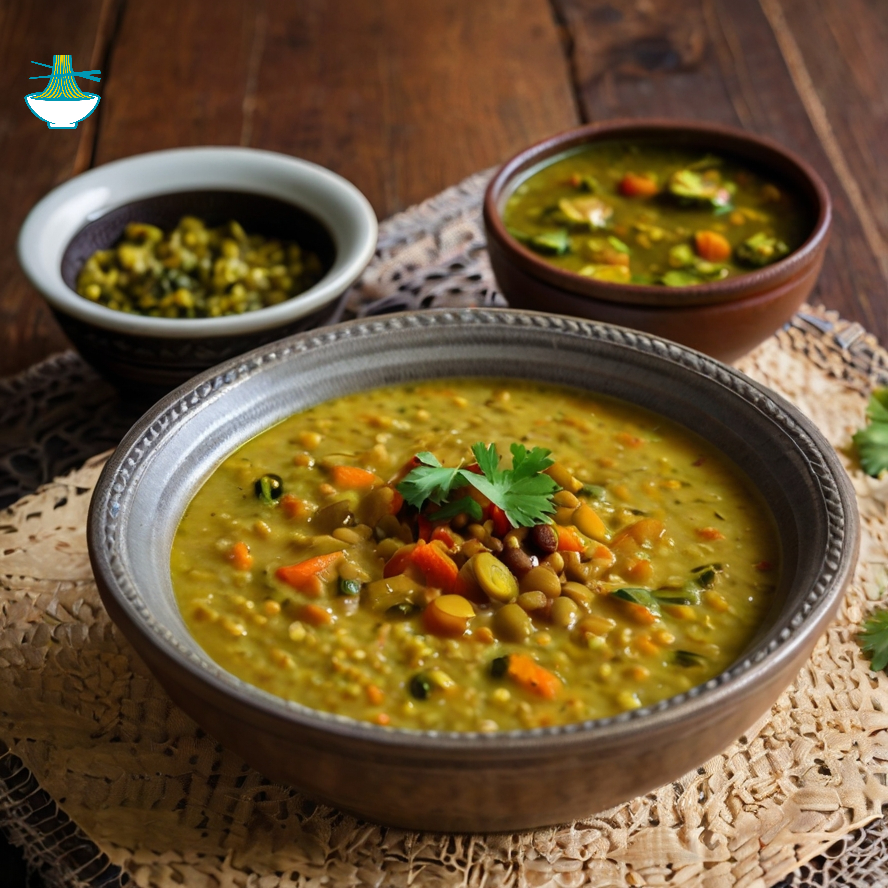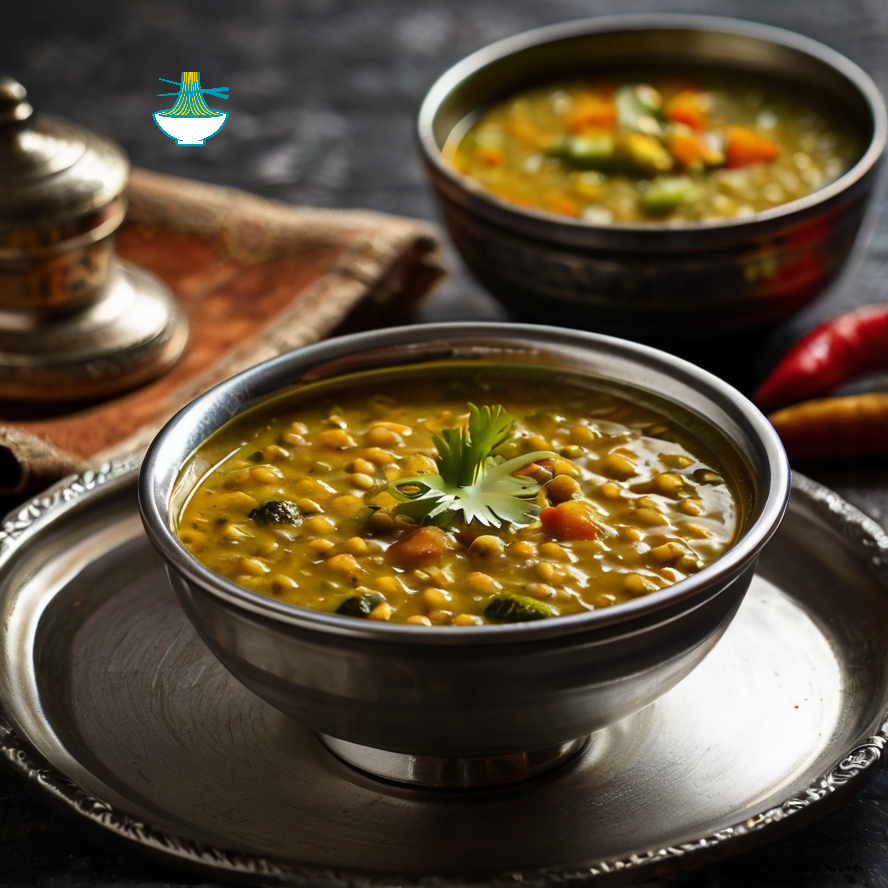Discover the authentic taste of Nepal with this traditional Dal Bhat recipe. A nourishing combination of spiced lentil soup (dal) and steamed rice (bhat), this meal is often accompanied by sautéed vegetables and tangy pickles. Perfect for a wholesome and satisfying meal, Dal Bhat is a staple in Nepali cuisine and offers a balance of flavors and nutrition. Learn how to prepare this simple yet flavorful dish at home with step-by-step instructions.
Ingredients:
For Dal (Lentil Soup):
- 1 cup split yellow lentils (moong dal)
- 4 cups water
- 1 onion, finely chopped
- 2 tomatoes, chopped
- 2 garlic cloves, minced
- 1-inch ginger, grated
- 2 green chilies, slit
- 1 tsp turmeric powder
- 1 tsp cumin seeds
- 1 tsp mustard seeds
- 1 tsp coriander powder
- 1 tbsp ghee or oil
- Salt to taste
- Fresh cilantro for garnish
For Bhat (Rice):
- 1 cup basmati rice
- 2 cups water
- 1 tbsp ghee or oil
- Salt to taste
For Vegetables:
- 1 cup mixed vegetables (e.g., carrots, potatoes, peas)
- 1 tbsp oil
- 1 tsp cumin seeds
- 1 tsp turmeric powder
- Salt to taste
For Pickles:
- 1/2 cup mixed pickles (achar)
Instructions:
Cook the Dal:
- Rinse the lentils thoroughly and soak for 15 minutes.
- In a pot, heat ghee or oil. Add cumin seeds and mustard seeds. Let them splutter.
- Add chopped onions, garlic, and ginger. Sauté until golden brown.
- Add tomatoes, green chilies, turmeric powder, and coriander powder. Cook until tomatoes soften.
- Drain the lentils and add them to the pot. Pour in water and bring to a boil.
- Reduce the heat and simmer for 20-25 minutes, stirring occasionally, until the lentils are fully cooked.
- Add salt to taste. Garnish with fresh cilantro before serving.
Cook the Rice:
- Rinse the rice until the water runs clear.
- In a pot, heat ghee or oil. Add rice and sauté for 2-3 minutes.
- Add water and salt. Bring to a boil.
- Lower the heat, cover, and simmer for 15 minutes or until rice is fully cooked.
Prepare the Vegetables:
- In a pan, heat oil. Add cumin seeds and let them crackle.
- Add the mixed vegetables, turmeric powder, and salt. Sauté until the vegetables are tender and cooked through.
Assemble the Dal Bhat:
- Serve the cooked rice (bhat) with a generous portion of lentil soup (dal) on the side.
- Add the sautéed vegetables and a small serving of pickles (achar) to complete the meal.
Enjoy your traditional Nepali Dal Bhat with its perfect blend of flavors and textures!
Nutritional Values
1 cup split yellow lentils (moong dal)
- Calories: About 350 kcal
- Carbohydrates: 60 grams
- Fat: 1 gram
- Protein: 25 grams
Benefits: High in protein and fiber, low in fat. Good for heart health and digestion.
4 cups water
Benefits: Hydrates the lentils and helps in cooking them to a soft consistency.
1 onion, finely chopped
- Calories: About 40 kcal
- Carbohydrates: 9 grams
- Fat: 0.1 grams
- Protein: 1 gram
Benefits: Adds flavor, contains antioxidants, vitamins C and B6, and manganese.
2 tomatoes, chopped
- Calories: About 18 kcal
- Carbohydrates: 4 grams
- Fat: 0.2 grams
- Protein: 1 gram
Benefits: Rich in vitamins C and A, antioxidants, and lycopene.
2 garlic cloves, minced
- Calories: About 5 kcal
- Carbohydrates: 1 gram
- Fat: 0 grams
- Protein: 0.2 grams
Benefits: Contains compounds with anti-inflammatory and immune-boosting properties.
1-inch ginger, grated
- Calories: About 80 kcal
- Carbohydrates: 18 grams
- Fat: 0.8 grams
- Protein: 1.8 grams
Benefits: Contains gingerol, which has anti-inflammatory and digestive benefits.
2 green chilies, slit
- Calories: About 40 kcal
- Carbohydrates: 9 grams
- Fat: 0.4 grams
- Protein: 2 grams
Benefits: Adds heat and contains vitamins A and C, and capsaicin which may boost metabolism.
1 tsp turmeric powder
- Calories: About 8 kcal
- Carbohydrates: 1.8 grams
- Fat: 0.2 grams
- Protein: 0.2 grams
Benefits: Contains curcumin, which has anti-inflammatory and antioxidant properties.
1 tsp cumin seeds
- Calories: About 8 kcal
- Carbohydrates: 1 gram
- Fat: 0.5 grams
- Protein: 0.3 grams
Benefits: Enhances digestion and adds flavor.
1 tsp mustard seeds
- Calories: About 10 kcal
- Carbohydrates: 0 grams
- Fat: 0.8 grams
- Protein: 0.5 grams
Benefits: Contains antioxidants and may aid digestion.
1 tsp coriander powder
- Calories: About 6 kcal
- Carbohydrates: 1 gram
- Fat: 0.3 grams
- Protein: 0.1 grams
Benefits: Adds flavor and aids in digestion.
1 tbsp ghee or oil
- Calories: About 120 kcal
- Fat: 14 grams
- Carbohydrates: 0 grams
- Protein: 0 grams
Benefits: Provides fat for flavor and energy.
Salt to taste
Benefits: Enhances flavor; use in moderation to manage sodium intake.
Fresh cilantro for garnish
- Calories: About 1 kcal
- Carbohydrates: 0 grams
- Fat: 0 grams
- Protein: 0 grams
Benefits: Adds flavor and provides vitamins A, C, and K, and antioxidants.
1 cup basmati rice
- Calories: About 365 kcal
- Carbohydrates: 80 grams
- Fat: 0.7 grams
- Protein: 7 grams
Benefits: Provides carbohydrates for energy.
2 cups water
Benefits: Needed for cooking the rice.
1 tbsp ghee or oil
- Calories: About 120 kcal
- Fat: 14 grams
- Carbohydrates: 0 grams
- Protein: 0 grams
Benefits: Adds flavor and provides fat.
Salt to taste
Benefits: Enhances flavor.
1 cup mixed vegetables (e.g., carrots, potatoes, peas)
- Calories: About 35 kcal
- Carbohydrates: 8 grams
- Fat: 0.5 grams
- Protein: 1.5 grams
Benefits: Provides vitamins, minerals, and fiber.
1 tbsp oil
- Calories: About 120 kcal
- Fat: 14 grams
- Carbohydrates: 0 grams
- Protein: 0 grams
Benefits: Used for cooking, adds necessary fats.
1 tsp cumin seeds
- Calories: About 8 kcal
- Carbohydrates: 1 gram
- Fat: 0.5 grams
- Protein: 0.3 grams
Benefits: Enhances flavor and aids digestion.
1 tsp turmeric powder
- Calories: About 8 kcal
- Carbohydrates: 1.8 grams
- Fat: 0.2 grams
- Protein: 0.2 grams
Benefits: Adds color and contains curcumin with anti-inflammatory properties.
Salt to taste
Benefits: Enhances flavor.
1/2 cup mixed pickles (achar)
- Calories: About 15 kcal
- Carbohydrates: 4 grams
- Fat: 0.1 grams
- Protein: 0.2 grams
Benefits: Adds tangy flavor; however, it is often high in sodium.
This combination provides a balanced meal with protein from lentils and meat, carbohydrates from rice and lentils, and essential vitamins and minerals from vegetables.


Comments